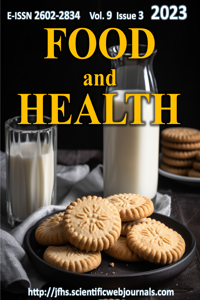Abstract
References
- Bogueva, D. Marinova, D. (2020). Cultured meat and Australia’s generation Z. Frontiers in Nutrition 7, 148. https://doi.org/10.3389/fnut.2020.00148
- Broad, G., Dillard, C., Bowman, D., Le Roy, B. (2022). Framing the futures of animal-free dairy: Using focus groups to explore early-adopter perceptions of the precision fermentation process. Frontiers in nutrition 9, 997632. https://doi.org/10.3389/fnut.2022.997632
- Bryant, C., Barnett, J. (2018). Consumer acceptance of cultured meat: A systematic review. Meat Science, 143, 8-17. https://doi.org/10.1016/j.meatsci.2018.04.008
- Büyüköztürk, Ş., Demirel, F. (2018). Bilimsel Araştırma Yöntemleri. Pegem Akademi pp. 392. ISBN: 978-9944-919-28-9
- Carfora, V., Cavallo, C., Caso, D., Del Giudice, T., De Devitiis, B., Viscecchia, R., Nardone, G., Cicia, G. (2019). Explaining consumer purchase behaviour for organic milk: Including trust and green self-identity within the theory of planned behaviour. Food Quality and Preference, 76, 1-9. https://doi.org/10.1016/j.foodqual.2019.03.006
- Clay, N., Garnett, T., Lorimer, J. (2020). Dairy intensification: Drivers, impacts and alternatives. Ambio, 49(1), 35-48. https://doi.org/10.1007/s13280-019-01177-y.
- Ebcim, B.Ç., Nakilcioğlu-Taş, E., Ötleş, S. (2021). İn vitro etin üretimi ve besleyici değeri. Sinop University Journal of Natural Sciences, 6(2), 189–201. https://doi.org/10.33484/sinopfbd.935965
- Falkeisen, A., Gorman, M., Knowles, S., Barker, S., Moss, R., McSweeney, M.B. (2022). Consumer perception and emotional responses to plant-based cheeses. Food Research International, 158, 111513. https://doi.org/10.1016/j.foodres.2022.111513
- Grasso, A.C., Hung, Y., Olthof, M.R., Verbeke, W., Brouwer., I. A. (2019). Older consumers’ readiness to accept alternative, more sustainable protein sources in the European Union. Nutrients, 11(8), 1904. https://doi.org/10.3390/nu11081904
- Karasar, N. (2008). Bilimsel Araştırma Yöntemi. Nobel Yayın Dağıtım, pp. 368. ISBN: 978-605-5426-58-3
- Loike, J.D. (2018). Biotechnological Applications to produce animal-free meat and milk: ethical considerations. Food & Nutrition Journal: FDNJ-181, 10, 2575-7091. https://doi.org/10.29011/2575-7091
- Mendly-Zambo, Z., Powell, L.J., Newman, L.L. (2021). Dairy 3.0: cellular agriculture and the future of milk. Food, Culture & Society, 24(5), 675-693. https://doi.org/10.1080/15528014.2021.1888411
- Pandya, R. (2014). Milk without the moo. New Scientist, 222(2975), 28-29. https://doi.org/10.1016/S0262-4079(14)61260-4 Perfect Day, (2019). Sustainable animal-free dairy & protein. http://www.perfectdayfoods.com/ (accessed 10.01.2023).
- Short, E.C., Kinchla, A.J., Nolden, A.A. (2021). Plant-based cheeses: A systematic review of sensory evaluation studies and strategies to increase consumer acceptance. Foods, 10(4), 725. https://doi.org/10.3390/foods10040725
- Su, C.H., Tsai, C.H., Chen, M.H., Lv, W.Q. (2019). U.S. sustainable food market generation Z consumer segments. Sustainability (Switzerland), 11(13). https://doi.org/10.3390/su11133607
- Szakály, Z., Kontor, E., Kovács, S., Popp, J., Pető, K., Polereczki, Z. (2018). Adaptation of the food choice questionnaire: The case of Hungary. British Food Journal, 120(7), 1474–1488. https://doi.org/10.1108/BFJ-07-2017-0404
- The Grocer, (2018). Test Tube Milk More Likely to Win Brits Than Lab-Grown Meat. https://www.thegrocer.co.uk/sourcing/test-tube-milk-more-likely-to-win-brits-than-lab-grown-meat/571598.article (accessed 10.01.2023).
- Ünver Alçay, A., Sağlam, A., Yalçın, S., Bostan, K. (2018). Geleceğin olası protein kaynakları. Akademik Gıda, 16(2), 197–204. https://doi.org/10.24323/akademik-gida.449865
- Zhengfu, Z.H.O.U., Yu, P.A.N.G., Wei Zhang, J.W., Yongliang, Y.A.N., Yingying Zheng, M.C., Zhihua, L.I.A.O., Min, L.I.N. (2021). Recombinant expression of milk proteins and biosynthesis of animal-free milk: analysis on related patents and trend for technology development. Synthetic Biology Journal, 2(5), 764. https://doi.org/10.12211/2096-8280.2021-057
- Zollman Thomas, O. Bryant, C. (2021). Don't Have a Cow, Man: Consumer Acceptance of Animal-Free Dairy Products in Five Countries. Frontiers in Sustainable Food Systems 5, 678491. https://doi.org/10.3389/fsufs.2021.678491
- Zuo, Y., Zhang, K., Xu, S., Law, R., Qiu, Q., Zhang, M. (2022). What kind of food can win Gen Z’s favor? A mixed methods study from China. Food Quality and Preference, 98, 104522. https://doi.org/10.1016/j.foodqual.2021.104522
Generation Z consume animal-free milk? A Türkiye experience
Abstract
This study aims to examine the perceptions of young people between the ages of 18-22 in Türkiye, studying at universities and representing Generation Z regarding the consumption of animal-free milk and to determine whether there will be a consumer base for animal-free milk in Türkiye in the coming years. For this purpose, 620 students were informed to participate in the research, but data were collected from 215 individuals. A face-to-face interview was conducted with the individual. 32.55% of the participants stated that they could consume animal-free milk. 27 (30%) of 90 female participants and 42 (33.6%) of 125 male participants stated that they could consume animal-free milk. Participants stated that they would not consume animal-free milk because they were concerned that animal-free milk is unhealthy, unnatural, insufficient in terms of nutritional value, unsafe, negatively affecting animal husbandry, and posing a problem in terms of belief. As a result, it has been seen that the Z-generation individuals living in Türkiye have the potential to consume animal-free milk. Suppose the participants’ concerns are clarified, and their familiarity with this product is increased. In that case, it is predicted that there will be a more severe increase in the animal-free milk consumption potential future in Türkiye.
Keywords
References
- Bogueva, D. Marinova, D. (2020). Cultured meat and Australia’s generation Z. Frontiers in Nutrition 7, 148. https://doi.org/10.3389/fnut.2020.00148
- Broad, G., Dillard, C., Bowman, D., Le Roy, B. (2022). Framing the futures of animal-free dairy: Using focus groups to explore early-adopter perceptions of the precision fermentation process. Frontiers in nutrition 9, 997632. https://doi.org/10.3389/fnut.2022.997632
- Bryant, C., Barnett, J. (2018). Consumer acceptance of cultured meat: A systematic review. Meat Science, 143, 8-17. https://doi.org/10.1016/j.meatsci.2018.04.008
- Büyüköztürk, Ş., Demirel, F. (2018). Bilimsel Araştırma Yöntemleri. Pegem Akademi pp. 392. ISBN: 978-9944-919-28-9
- Carfora, V., Cavallo, C., Caso, D., Del Giudice, T., De Devitiis, B., Viscecchia, R., Nardone, G., Cicia, G. (2019). Explaining consumer purchase behaviour for organic milk: Including trust and green self-identity within the theory of planned behaviour. Food Quality and Preference, 76, 1-9. https://doi.org/10.1016/j.foodqual.2019.03.006
- Clay, N., Garnett, T., Lorimer, J. (2020). Dairy intensification: Drivers, impacts and alternatives. Ambio, 49(1), 35-48. https://doi.org/10.1007/s13280-019-01177-y.
- Ebcim, B.Ç., Nakilcioğlu-Taş, E., Ötleş, S. (2021). İn vitro etin üretimi ve besleyici değeri. Sinop University Journal of Natural Sciences, 6(2), 189–201. https://doi.org/10.33484/sinopfbd.935965
- Falkeisen, A., Gorman, M., Knowles, S., Barker, S., Moss, R., McSweeney, M.B. (2022). Consumer perception and emotional responses to plant-based cheeses. Food Research International, 158, 111513. https://doi.org/10.1016/j.foodres.2022.111513
- Grasso, A.C., Hung, Y., Olthof, M.R., Verbeke, W., Brouwer., I. A. (2019). Older consumers’ readiness to accept alternative, more sustainable protein sources in the European Union. Nutrients, 11(8), 1904. https://doi.org/10.3390/nu11081904
- Karasar, N. (2008). Bilimsel Araştırma Yöntemi. Nobel Yayın Dağıtım, pp. 368. ISBN: 978-605-5426-58-3
- Loike, J.D. (2018). Biotechnological Applications to produce animal-free meat and milk: ethical considerations. Food & Nutrition Journal: FDNJ-181, 10, 2575-7091. https://doi.org/10.29011/2575-7091
- Mendly-Zambo, Z., Powell, L.J., Newman, L.L. (2021). Dairy 3.0: cellular agriculture and the future of milk. Food, Culture & Society, 24(5), 675-693. https://doi.org/10.1080/15528014.2021.1888411
- Pandya, R. (2014). Milk without the moo. New Scientist, 222(2975), 28-29. https://doi.org/10.1016/S0262-4079(14)61260-4 Perfect Day, (2019). Sustainable animal-free dairy & protein. http://www.perfectdayfoods.com/ (accessed 10.01.2023).
- Short, E.C., Kinchla, A.J., Nolden, A.A. (2021). Plant-based cheeses: A systematic review of sensory evaluation studies and strategies to increase consumer acceptance. Foods, 10(4), 725. https://doi.org/10.3390/foods10040725
- Su, C.H., Tsai, C.H., Chen, M.H., Lv, W.Q. (2019). U.S. sustainable food market generation Z consumer segments. Sustainability (Switzerland), 11(13). https://doi.org/10.3390/su11133607
- Szakály, Z., Kontor, E., Kovács, S., Popp, J., Pető, K., Polereczki, Z. (2018). Adaptation of the food choice questionnaire: The case of Hungary. British Food Journal, 120(7), 1474–1488. https://doi.org/10.1108/BFJ-07-2017-0404
- The Grocer, (2018). Test Tube Milk More Likely to Win Brits Than Lab-Grown Meat. https://www.thegrocer.co.uk/sourcing/test-tube-milk-more-likely-to-win-brits-than-lab-grown-meat/571598.article (accessed 10.01.2023).
- Ünver Alçay, A., Sağlam, A., Yalçın, S., Bostan, K. (2018). Geleceğin olası protein kaynakları. Akademik Gıda, 16(2), 197–204. https://doi.org/10.24323/akademik-gida.449865
- Zhengfu, Z.H.O.U., Yu, P.A.N.G., Wei Zhang, J.W., Yongliang, Y.A.N., Yingying Zheng, M.C., Zhihua, L.I.A.O., Min, L.I.N. (2021). Recombinant expression of milk proteins and biosynthesis of animal-free milk: analysis on related patents and trend for technology development. Synthetic Biology Journal, 2(5), 764. https://doi.org/10.12211/2096-8280.2021-057
- Zollman Thomas, O. Bryant, C. (2021). Don't Have a Cow, Man: Consumer Acceptance of Animal-Free Dairy Products in Five Countries. Frontiers in Sustainable Food Systems 5, 678491. https://doi.org/10.3389/fsufs.2021.678491
- Zuo, Y., Zhang, K., Xu, S., Law, R., Qiu, Q., Zhang, M. (2022). What kind of food can win Gen Z’s favor? A mixed methods study from China. Food Quality and Preference, 98, 104522. https://doi.org/10.1016/j.foodqual.2021.104522
Details
| Primary Language | English |
|---|---|
| Subjects | Food Engineering |
| Journal Section | Research Articles |
| Authors | |
| Early Pub Date | July 2, 2023 |
| Publication Date | July 5, 2023 |
| Submission Date | March 29, 2023 |
| Published in Issue | Year 2023 Volume: 9 Issue: 3 |
Journal is licensed under a
CreativeCommons Attribtion-ShareAlike 4.0 International Licence 


Diamond Open Access refers to a scholarly publication model in which journals and platforms do not charge fees to either authors or readers.
Open Access Statement:
This is an open access journal which means that all content is freely available without charge to the user or his/her institution. Users are allowed to read, download, copy, distribute, print, search, or link to the full texts of the articles, or use them for any other lawful purpose, without asking prior permission from the publisher or the author. This is in accordance with the BOAI definition of open access.
Archiving Policy:
Archiving is done according to ULAKBİM "DergiPark" publication policy (LOCKSS).

